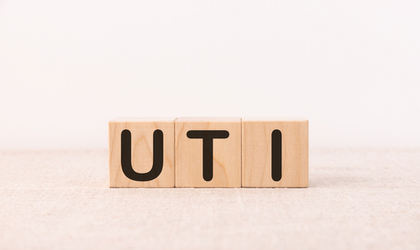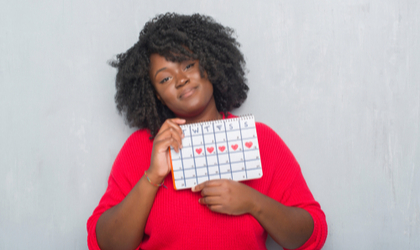
A plant-based diet is widely touted as a panacea for good health. And this approach to eating is growing in popularity, too. According to The Vegan Society, the number of vegans in the UK quadrupled between 2014 and 2019 (1). It seems to be out with the old: meat and two veg – and in with the new: plant-powered goodness.
Can women live on a plant-based diet?
Eating more plants is said to support your heart, longevity, weight management, and cognition. But before you dive into the bounty of lentils and tofu and veggies, it’s worth mentioning that women are more likely to experience nutritional deficiencies when eliminating entire food groups, like meat and dairy. That doesn’t mean women can’t reap the fruits (literally) of a plant-based diet; it just means they need to exercise a little more caution due to menstruation and pregnancy.
Veganism and periods
Each month, women who menstruate lose iron-containing blood, which – when combined with a low iron intake from eliminating animal products – may increase the risk of an iron deficiency. And low iron stores are known to weaken immunity, compromise mental and physical performance, and deplete energy levels.
If you don’t eat meat, it’s important to get enough iron from other plant sources, including kale, cashew nuts, tofu, beans, lentils, chickpeas, quinoa, hemp seeds, and dried figs, especially if you experience heavy menstrual bleeding each month.
Aside from eating more of these foods, you may also want to add an iron supplement to your diet. Our high-strength multivitamin, Multi-Guard® Active packs a generous 14mg of iron, along with a range of useful nutrients for menstruating women, like selenium, zinc, and chromium.
Can being vegan cause a hormonal imbalance?
Some people have raised concerns that a vegan diet may disrupt hormones and cause oestrogen dominance. This is often down to the popularity of processed soy-based products, which contain phytoestrogens, compounds that operate like oestrogen in the body and, as a result, may increase oestrogen levels. Oestrogen dominance can lead to mood swings, breast tenderness, abnormal menstruation, PMS, headaches, bloating, and hormonal weight gain.
To support your hormonal health on a plant-based diet, try to eat a few servings of fermented soy products a week. Tempeh, tofu, and miso are great options. Where possible, keep soy milk, yoghurt and desserts – as well as vegan meat alternatives – to a minimum.
Veganism and pregnancy
The British Dietetic Association has stated that a well-planned, balanced plant-based diet can meet the nutritional needs of children and adults, including during pregnancy (2). So, yes – you can still have your chickpea burger and eat it, too;, just ensure you’re ticking all the following nutritional boxes.
Vegan iron sources
One mineral to keep in mind is iron. Iron is needed for healthy red blood cells, which transport oxygen around your body to your baby, as well as to your major organs and tissues. During pregnancy, the amount of blood in your body increases by 50 per cent – and your iron requirement jumps from 14mg to 27mg. Without adequate amounts of iron, you may feel tired and lethargic.
Meat isn’t the only rich source of iron; you can also find it in tofu, beans, chickpeas, lentils, quinoa, dried apricots, dried figs, raisins, hemp seeds, chia seeds, and pumpkin seeds. You may also wish to supplement with our Vegan Iron Complex to support your intake.
Vegan calcium sources
For expectant mums on a plant-based diet, calcium is especially important. Not only does it maintain your skeletal health, but it helps build your baby’s rapidly developing teeth and bones. And if you don’t have enough calcium for your baby, your body will deplete its own stores, meaning you’re at a higher risk of bone loss during pregnancy.
Move aside cheese and milk; sesame seeds, tahini, calcium-set tofu, pulses, green leafy veggies, and fortified plant milk are also crammed with calcium.
How much calcium do you need in pregnancy?
Pregnant women need around 1000mg of calcium daily, which is around four servings of calcium-rich food per day.
Iodine in pregnancy
Iodine is vital in pregnancy, too. It’s one of the most important nutrients a developing baby needs for physical growth and cognitive development. Iodine also involved in normal thyroid function, which regulates heart rate, metabolism, and body temperature. Getting enough iodine will ensure your baby also develops a healthy thyroid.
During pregnancy, your iodine requirement increases from 150 to 250μg. Although iodine is commonly found in fish and shellfish, some plant foods contain iodine, including courgettes, kale, green beans, whole grains, watercress, spring greens, and organic potatoes with skin. However, the safest way to cover any nutritional shortfalls is taking a high-strength iodine supplement that delivers 150μg.
B12 deficiency in pregnancy
Vitamin B12 is another important nutrient for mums-to-be, especially those on a vegan diet. Without enough vitamin B12, pregnant mums risk their babies developing neural tube defects (3).That’s because it plays a vital role in the normal functioning of the nervous system, red blood cell formation, and cell division, all of which are critical for a growing baby.
Mainly found in animal sources, vitamin B12 is hard to obtain on a plant-based diet, especially if you aren’t a Marmite fan (yeast extract is fortified with vitamin B12). For peace of mind, we recommend taking a maximum-strength vitamin B12 supplement that provides at least 1000µg.
Vitamin D3 in pregnancy
We all need vitamin D for good health and happiness. But it’s particularly important during pregnancy since it supports the development of your baby’s bones, teeth and muscles.
Unfortunately, when it comes to plant-based sources of vitamin D, the options are few and far between. Mushrooms and fortified cereals, dairy-free milk, and juice provide some vitamin D but nowhere near enough to support you and your growing baby. Adding a vegan vitamin D supplement to your diet is an excellent insurance policy during pregnancy. Look for a formula that supplies around 1000iu.
Omega 3 and pregnancy
Ensuring a plentiful intake of omega-3 is also essential in pregnancy. Maternal intake of docosahexaenoic acid (DHA), a long-chain fatty acid, contributes to normal foetal visual and brain development. It’s nothing short of vital.
Microalgae are crammed with plant-based, vegan-friendly, high-strength DHA. They're tiny plant organisms that fish feast on to obtain their omega 3s, so it effectively cuts out the middle-man (or fish!). Adding a Vegan Omega 3 supplement to your pregnancy arsenal is one of the best ways to stay on top of your intake.
Chronic telogen effluvium
It’s worth noting that women on vegan diets are also more likely to experience hair shedding, a condition called chronic telogen effluvium (CTE). If there’s a noticeable increase in the number of hairs lost when brushing and shampooing – or there’s less hair in your ponytail altogether – it may be CTE. And, more often than not, it’s related to your diet.
What causes chronic telogen effluvium?
Evidence suggests low iron levels are the primary risk factor for CTE among women (13). Poor iron stores typically result from the loss of blood during menstruation. But if there’s little to no red meat in the diet, the gradual depletion of available iron is quickly accelerated.
How do you reverse chronic telogen effluvium?
Besides upping your dietary intake of plant iron sources, taking a vegan iron supplement – either Iron 14mg as Citrate or Multi-Guard® Active, both of which provide relevant levels of iron at 14mg – should help you achieve the recommended daily allowance of 14.8mg for adult women, and support healthy locks.
Whatever your reasons for adopting a plant-powered approach, there’s no doubt a well-balanced vegan diet is one of the best ways to support your health. As a woman, it’s worth being mindful that this way of eating requires a little more planning around menstruation and pregnancy. But with that in place, nothing’s stopping you from enjoying the many benefits of plants.
Want to find out more?
Read more of our resources on women’s health here. You can also reach out to our expert Nutrition Advice team via email, phone or Live Chat to receive free nutrition advice. No matter how small your query, they’re happy to help.
References
-
Key facts (2022). Available online: https://www.vegansociety.com/about-us/further-information/key-facts
-
Bda.uk.com. (2022). British Dietetic Association confirms well-planned vegan diets can support healthy living in people of all ages. Available online: https://www.bda.uk.com/news/view?id=179
-
Vitamin B12 or folate deficiency anaemia - Complications. (2022). Retrieved 10 October 2022Available online: https://www.nhs.uk/conditions/vitamin-b12-or-folate-deficiency-anaemia/complications
Related Posts
Disclaimer: The information presented by Nature's Best is for informational purposes only. It is based on scientific studies (human, animal, or in vitro), clinical experience, or traditional usage as cited in each article. The results reported may not necessarily occur in all individuals. Self-treatment is not recommended for life-threatening conditions that require medical treatment under a doctor's care. For many of the conditions discussed, treatment with prescription or over the counter medication is also available. Consult your doctor, practitioner, and/or pharmacist for any health problem and before using any supplements or before making any changes in prescribed medications.

Olivia
Olivia Salter has always been an avid health nut. After graduating from the University of Bristol, she began working for a nutritional consultancy where she discovered her passion for all things wellness-related. There, she executed much of the company’s content marketing strategy and found her niche in health writing, publishing articles in Women’s Health, Mind Body Green, Thrive and Psychologies.



